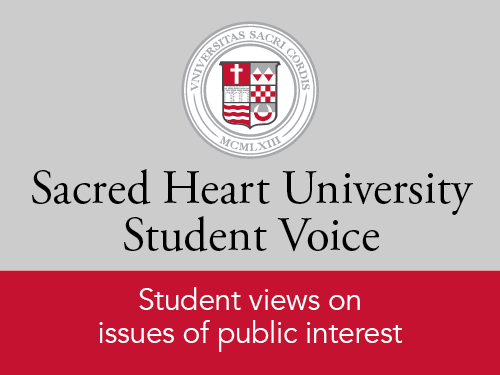
Minor in Nutrition
Inclement Weather: February 25, 2026
All classes starting prior to 11 a.m. will be remote. Classes after 11 a.m. will be in person. Non-essential staff should work remote until 11 a.m. then report to campus as scheduled.
With a minor in nutrition, you’ll gain the skills needed to advance health, healing and wellness in our world.
Why Earn Your Minor in Nutrition at Sacred Heart?
The minor in nutrition at Sacred Heart University is designed to provide students with a background in nutrition to enhance their knowledge of health care principles. Students learn basic concepts of human nutrition and the relationships between nutrition, health and disease across the lifespan.
Learning Outcomes
Our minor in nutrition equips students with the skills and knowledge they need for future health care practice.
Students will:
- Learn to make nutrition recommendations based on health status and the best available research
- Demonstrate clinical reasoning and decision-making skills
- Effectively communicate and collaborate as part of a team
- Understand practicing nutrition in an ethical manner
Who Can Earn a Minor in Nutrition?
Sacred Heart full-time undergraduate students in any major may declare a minor in nutrition.
Career Outlook
The Bureau of Labor Statistics reports the career outlook for nutritionists is projected to grow 11% from 2020 to 2030, much faster than the average for all occupations. Nutritionists can work in a variety of settings, including corporate wellness, nutrition counseling and in a private practice, among many others.
Program Requirements
Students can take either CH 341, CH 201 or CH 117. Exercise Science students can take EX 255 or HS 308.
Designated for Nursing students, this course previews the principles of general chemistry, followed by a survey of organic chemistry. An overview of biochemistry and biomolecules and a study of metabolism and its regulation are presented. Two 75-minute class periods per week.
Prerequisite: Take CH-119
Designated for Nursing students, this course consists of eleven to twelve lab periods. Three to four dry labs are embedded within the course as a guided inquiry-based approach to the curriculum and computer problem-solving and molecular modeling using HyperChem. Experiments as well as dry labs are related to the subject matter covered in CH 117. One three-hour lab period per week.
Prerequisite: Take CH-117
This is an introductory level course for students pursuing a degree in clinical nutrition. The course provides an overview of the chemistry and metabolism of carbohydrates, lipids, and amino acids. The structure and function of proteins and enzymes will also be discussed. Concepts are discussed in the context of human nutrition diseases to further understand how biochemical processes are relevant to human life.
Prerequisite: Take CH-151 or CH-117
Covers chemical and physiological properties of carbohydrates, lipids, amino acids, proteins, enzymes, and nucleic acids. Explores metabolic pathways and enzymology. Two 75-minute lectures per week. A prerequisite to CH 342.
Prerequisite: Take CH-222 and CH-224
This course presents the fundamental scientific principles of human nutrition. Students will learn the components of a healthy diet, understand the major nutrition problems that affect individuals and populations throughout the life cycle, and understand the scientific basis for nutritional recommendations for health and to prevent disease.
Elective Courses
Choose three of the following. Choose either HS 347 or MPH 528. Choose either HS 313 or MPH 580.
In Food and Culture, we will determine how people use food to define themselves as individuals, groups or whole societies. This course introduces the student to the study of food, health beliefs and culture of diverse groups in Asia, Africa, the Americas, Caribbean Islands, and Europe. We will identify the significance and meaning of food in different cultures by exploring the way that ethnicity, gender, socioeconomic status and religion influence our preferences and food choices. It explores intercultural communication strategies to help the student learn to work effectively with members of different ethnic and religious groups in a culturally sensitive manner. Prerequisite: HS 308
Prerequisite: Take HS-308 or EX-255
Medical nutrition therapy introduces the role played by therapeutic diets in the treatment of chronic disease and other nutritional disorders. The course introduces the principles of the nutrition care process and will give knowledge and experience in nutrition assessment techniques and intervention strategies. General topics include; the pathophysiology of disease processes, nutrition assessment, diagnosis, intervention, monitoring, and evaluation to recover from disease conditions, and/or to improve the quality of life. Nutrient delivery via oral, enteral, and parenteral routes, and interactions among foods, nutrients, medications, and supplements will be explored. Introduction to coding and billing of nutrition and dietetics services to obtain reimbursement for services provided. Pre-requisites: HS 308 Fundamentals of Nutrition or EX 255 Nutritional Aspects of Human Health & Performance
Prerequisite: Take HS-308 or EX-255
This course covers the impact of nutrition on human development, growth, and aging across the life cycle with emphasis on the specific nutritional requirements in preconception, pregnancy and lactation, childhood and adolescence, adulthood and older adulthood. Building upon basic nutritional concepts, consideration is given to factors affecting food selection, nutrition and chronic disease, and wellness within the context of each stage of human development. Pre-requisite: HS 308 Fundamentals of Nutrition or EX 255 Nutritional Aspects of Human Health & Performance
Prerequisite: Take HS-308 or EX-255
This course teaches students to understand how key nutrients (carbohydrates, lipids, proteins, vitamins, minerals, and water) affect health, disease, energy balance, and weight control. Students will learn the impact culture has on health and food choices, and how to apply components of good nutrition within these limitations. Other barriers to healthy nutrition are covered. Prerequisite: HS 308 or EX 255.
Prerequisite: Take HS-308 or EX-255
This course is designed to prepare students to understand and apply nutrition principles in the geriatric population. This course examines how co-morbidities can and will have different effects on the older individual. An approach on assessing each case/client as an individual will have the best outcomes. Pre-requisite: HS 308 Fundamentals of Nutrition
Prerequisite: Take HS-308 or EX-255
Students preparing for careers in nutrition and dietetics are expected to gain competency for professional practice in a wide range of disciplines and be able to effectively translate sciences including epidemiology, food, nutrition and human behavior, in a manner that strives to improve the health, nutrition, and well-being of individuals and groups within communities.This course examines the current state of knowledge regarding diet and nutritional indicators as etiologic factors in disease and teaches skills for reading and interpreting the evidence-based literature. Course Prerequisites HS-308 Nutrition Fundamentals
Prerequisite: Take HS-308 or EX-255
Nutrition is a key determinant of population health. The course explores how social identity and cultural values influence food security, health disparities, and risk for disease. Health promotion and disease prevention are relevant to many disciplines and in several areas. During the course, students will apply principles of translational epidemiology in various public health settings. Finally, by the end of this course, students will have a deeper understanding of which population groups in the U.S. require assistance from nutritional programs, what these programs are, and how they operate.
Food is a universal language - everybody eats! Like most languages, food varies from place to place. International travel allows for an immersive food and eating experience. The course will introduce students to the role of food and nutrition in society and culture. Assignments that specifically investigate the cultural, social, and scientific aspects of food and nutrition will help expand our understanding of food as cultural identity, and nutrition as an integrated discipline in public health.
More Information
The Latest in Health Sciences
View More News-
 Faculty & Staff SpotlightPublished:Jordan Schweidenback brings experience in practice, administration and academic leadership to new SHU position
Faculty & Staff SpotlightPublished:Jordan Schweidenback brings experience in practice, administration and academic leadership to new SHU position -

AI is America’s First Stop for Health Answers
SHU in the NewsPublished:Sacred Heart University poll with GreatBlue Research and Gray Media confirms as access to care gets harder, patients look to AI for answers without giving up control or trust -

SHU Students Address Issues of Injustice in CT Mirror Opinion Pieces
Academics, Community OutreachPublished:Guest editorials focus on gun violence, housing crisis, mental health, public education and more

